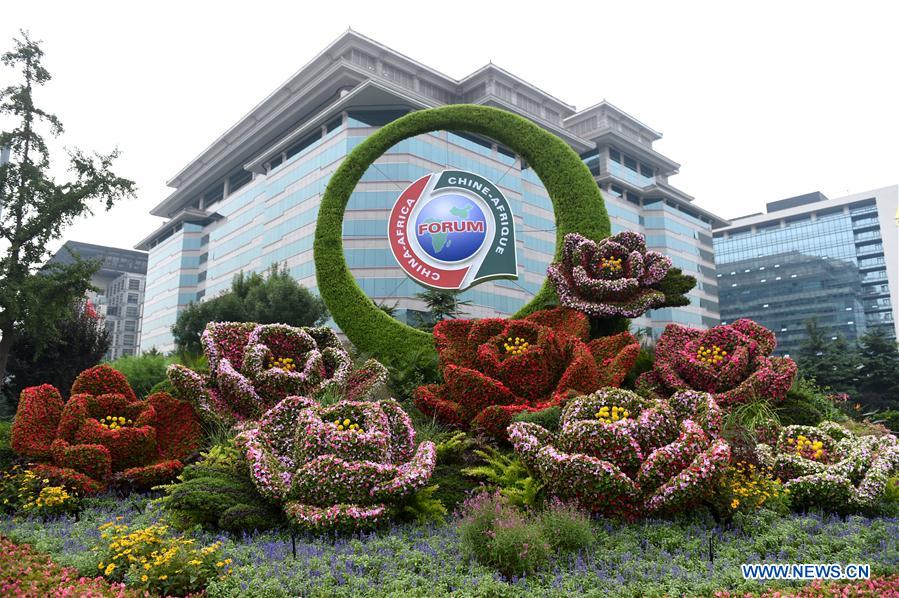Pax Sinica in Africa?
- By Sumantra Maitra
 0 Comment(s)
0 Comment(s) Print
Print E-mail China.org.cn, September 13, 2018
E-mail China.org.cn, September 13, 2018

When I was a rookie journalist, one of my colleagues got a Confucius scholarship to study Chinese in Africa. Intending to work in trade between China and Africa, he raised some eyebrows among other friends who couldn't understand a Chinese desire to invest in Africa or African support for it.
The recent summit of the Forum on China-Africa Cooperation (FOCAC) reminds me of that old debates. Is it the dawn of Pax Sinica in Africa? If so, how should Western states compete with China in Africa and what benefits does Africa gain from Chinese investment?
Some Westerners are talking of a "Chinese Marshall Plan" for Africa, after the Forum saw China pledge another US$60 billion, the same amount it promised in 2015. It has also led to a lot of soul searching, and teeth gnashing, in certain sectors, as Africa is seen as a new battleground of geopolitical rivalry and great power politics. However, these are half-baked concerns that don't stand up to scrutiny.
Consider the significant advantage China has in doing business in this region. China has kept humanitarian interference to a minimum. When African leaders say that China-Africa relations are based on equality, it raises sniggers in the West. After all Chinese economic heft is gigantic compared to any average African economy.
However, that is a false premise to start with. First of all, when African leaders say that they feel equal in China, they are hinting at the West lecturing them about human rights, culture and governance systems. For a region that was historically subjected to colonialism, any foreign lecturing of this sort faces this unhappy legacy.
The foreign policy and even financial aid in the West is tied up with human rights concern, and democratic values, something inherently seen as liberal and progressive in the West but quasi-Imperial in the global south.
Of course, not every Western policymaker wants that, and there are sections of academia who are continuously calling for the West to change the model from human rights-based rebukes and aid to a more cooperative investment type. However, they are a minority.
Compare that with the "Five No" plan of China, as espoused by President Xi Jinping. China has ruled out any attachment of political conditions to aid offers, any interference in internal affairs or system of governance, any imposition of force, or any interference in development.
The approach of China towards Africa, which takes away any external interference, or even element of pious lecturing about what path of development and governance Africans should follow, removes the fundamental skepticism about Chinese military boots being tied to aid money. It also follows a basic truth of geopolitics: a region should have political systems based on regional peculiarities and culture, and the imposition of foreign values does more harm than good.
Finally, the Chinese development model relies on investment, instead of aid. As Zambian economist Dambisa Moyo wrote in her 2010 book "Dead Aid," any form of aid only goes to a specific sector of African politics, and actually cuts off internal development. Investment, on the other hand, is a fundamentally better model as it stabilizes regions by providing jobs.
Western foreign aid essentially goes to African leaders through NGOs, with chances of the money being channelized to rigged areas. Investment is a bottom-up approach instead of a top-down one. The observed social and political results are phenomenal. The number of African student exchanges in China keeps increasing, and African leaders are steadily jumping on the band wagon to strengthen ties with the Asian power.
However, there's one thing that sooner or later Chinese policymakers will have to think about. The threat of terrorism, and security threats to interests in Africa will grow and continue to increase. There might be a moment when China has to face a decision on whether to secure its interests in the region, and everyone needs to be prepared for that.
Overall, however, the FOCA 2018 summit continued to be a platform for economic and geopolitical benefit for both China and Africa. Non-interference coupled with investment is the way forward.
Sumantra Maitra is a columnist with China.org.cn. For more information please visit:
http://www.china.org.cn/opinion/SumantraMaitra.htm
Opinion articles reflect the views of their authors only, not necessarily those of China.org.cn.






Go to Forum >>0 Comment(s)